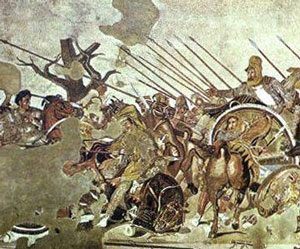
Hellenistic Greece: Alexander fights Darius at Issus (mosaic from Pompeii)
Socrates and Plato
After the Peloponnesian War was over, all the cities of Greece were worn out and poor. Many men went and fought for the Persians for money. But others tried to rebuild the cities. This was the time of the great philosophers, Socrates and his student Plato.
The Peloponnesian War
Who was Socrates?
Plato’s philosophy
Short history of Greece
All our ancient Greece articles

Hellenistic Greece: Philip of Macedon (on a coin)
Philip of Macedon
To the north of Greece, there was a country called Macedon (MA-suh-donn). King Philip of Macedon noticed that the Greeks were very weak. So he attacked the Greek city-states. One by one he took them over: first Thebes, then Athens, then Sparta.
What is a city-state?
Alexander of Macedon
Where is Thebes?
Hellenistic Athens
What about Sparta?
The Persian Empire
When Philip was assassinated in 336 BC, his son Alexander became king. So he also ruled Greece. Alexander was only 20 when he became king. At first a lot of people thought he might be too young. But he not only held onto Greece, he also took a big army of Greeks and Macedonians and attacked the Persian Empire!
Alexander the Great
Alexander was a great general, and the Persians were also weak at this time. So, little by little, Alexander took over the Persian Empire. First he conquered Lydia, then Phoenicia, then Israel, then Egypt. Then he took his army further east. They went all the way to Afghanistan and India (see map).
Lydians (modern Turkey)
Who were the Phoenicians?
Egypt under Persian rule
Alexander’s death
In India Alexander’s troops refused to go any further (or so the story goes), and he turned back. But a lot of the soldiers died on the way back, and soon afterwards, in 323 BC, Alexander himself died of a fever, in Babylon. He was 33 years old.
Hellenistic kingdoms
Alexander died without any sons (though his wife Roxane was pregnant). So his generals split up his kingdom. There were three main parts. His general Ptolemy took Egypt. Seleucus ruled Seleucia (modern Israel, Syria, Iraq, Iran, and Afghanistan). Macedon and Greece had other rulers.
Egypt under the Ptolemies
Maccabees and Israel
The Sogdians in Afghanistan
Hellenistic Greek government
Although these three kingdoms often fought each other, still the Hellenistic period was one of wealth and learning. Peace allowed traders, artists, and scientists to travel between Africa, India, Iran, Iraq, and Greece. The Ptolemies started a great university at Alexandria, in Egypt. The philosopher Aristotle worked in Athens.
Who was Aristotle?
Hellenistic economy
The university at Alexandria
Ancient Greek science
Greek mathematics
Hellenistic sculpture
The combination of the knowledge of Africa, West Asia, and India with that of the Greeks led to great achievements in science, in philosophy, and in art. But these kingdoms, and the peace, lasted only about two hundred years, until the Romans and the Parthians divided West Asia between them.
More about Alexander the Great
Greece under Roman rule
Bibliography and further reading about Hellenistic Greece:
Oxford First Ancient History, by Roy Burrell and Peter Connolly (1997). Lively interviews and pictures make the ancient Mediterranean come to life. For teens.
Alexander the Great, by Samuel Willard Crompton (2003). For teenagers.
Alexander the Great, by Robin Lane Fox (reprinted 1994). Lane Fox is a good writer.
The Hellenistic World and the Coming of Rome, by Erich S. Gruen (1984).
The Greek World After Alexander, 323-30 BC, by Graham Shipley (2000). Takes a more positive view of the Hellenistic period than Gruen, but it’s not as entertaining to read.